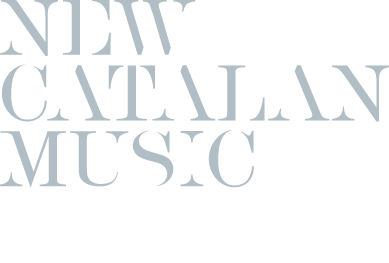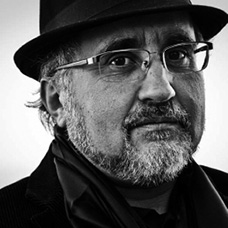Agustí Charles
Contemporary music
(Agustí Charles, Manresa 1960)
He studied at the conservatories in Manresa, Barcelona, Badalona and at the Conservatori del Liceu. He began composing under the teachings of Miquel Roger, Albert Sardà and Josep Soler, and went on to complete his training with Cristóbal Halffter, Tomás Marco, Antón García Abril, Franco Donatoni, Luigi Nono and Samuel Adler. He also received jazz training from Manel Camp. Considered one of the most important composers of his generation, his works have been awarded in more than forty competitions (both national and international). He has also received a countless number of commissions from prestigious music institutions.
Considered one of the most important composers of his generation, his works have been awarded in more than forty competitions (both national and international). He has also received a countless number of commissions from prestigious music institutions. Author of many compositions for orchestra, chamber, voice and electronic groups, his early work shows an influence from the Vienna School, from which he would gradually steer away so as to create his own language, starting from the assimilation of different contemporary music styles. In his own words, his main interest has been to “work on pieces where anything or everything could be analyzed and where one can find particular displays of colour and organization”.
Among his orchestral works are Iunxi (Reina Sofía award 1988), Effigies (1991), Double concerto for oboe and a soloist harp (1993), Double Variations (1994), Cello Concerto (1995), Piano Concerto (1995), Sax-Concerto (1997), Seven Looks (AEOS 2003 Composition award), Concierto para orquesta (2004) and Elapsed memories (El transcórrer dels records), commissioned by the Orquestra Simfònica de Barcelona i Nacional de Catalunya (OBC) and premiered in 2007. All of these works show an impeccable writing that is rich in nuance. His writing has gradually achieved maximum clarity, transparency and tonal refinement. Inspired by orchestral methods, his work displays an imaginative set of colours, textures and dynamics, and a narrative meaning that escapes all gratuitous experimentation in order to directly reach the audience.
Some of his chamber works include: Colors, for clarinet, bassoon and piano (1985); Per a Lola (Fundación Juan March award, 1986); Trio, for violin, cello and piano (F. Civil de Girona award, 1988); Ubergang, for a saxophone quartet (Ciutat de València award, 1988); Glosa, for an instrumental group (1989); Concierto para fagot (1996); Concierto para acordeón (1996); sssssssshhh....tk, for a flute quartet (1999), Final Landscape (2000), Enigmatic Vision (2001), Unstable Surface (2004); Concierto para clarinete (2006) and String Quartet n. 2 (2007), premiered by the Arditti Quartet during the Festival Nous Sons 2008. Some of his vocal works are: Cantata, for a tenor soloist, mixed choir and orchestra (Òscar Esplà award 1991); Laments, for contralto, viola and an instrumental group (Forum Jünger Komponisten award 1992); Lontain interior (1992) and Primary Colors, for three female vocalists and four percussionists, commissioned by the Fundació Caixa Catalunya for the Malèvitx exhibit. He has also written pieces for children, music for the cobla, and the chamber opera La Cuzzoni. Esperpent d’una veu, with libretto by Marc Rosich, premiered in Darmstadt in October 2007 and was later performed in Barcelona (2007) and Madrid (2008).
This chamber catalogue only expanded during 2008 with the premiere of many scores, such as Quartet de corda núm. 2, «Onada», performed for the first time on February 23, 2008, as part of the Festival Nou Sons de Barcelona, by the Arditti Quartet. Then in March 2010 they premiered his Quartet de corda núm. 1 in Barcelona. Before 2008 ended, there were two more premieres: the percussion quartet Bars Games at Nüremberg (Germany) by the group Esclats on December 7, and the Concert per a fagot, performed at the Auditori de Barcelona on December 23 by Guillermo Salcedo and the group Barcelona 216, and conducted by Francesc Prats.
On January 16, 2009, Grup21 premiered Piccolo Concerto in Barcelona and in October of that same year, the Soloists of the Orquesta de la Comunidad de Madrid (ORCAM), conducted by José Ramón Encinar, premiered Concertino in Milan. 2010 was also a prolific year due to his showcase of new scores: Inner Changes, for double bass, vibraphone and a percussion quartet, premiered at the first Festival de Música Contemporània de Tarragona; the concert for guitar ...di un soffio d’aura, performed by Àlex Garrobé and the instrumental group Barcelona 216, conducted by Ernest Martínez Izquierdo, at the Auditorio de Zaragoza; Border Zone, for a chamber group, and Preludio a Melisendra, presented by the Orquestra de Cadaqués.
The greatest challenge for the composer, however, was to come the following year, in 2011 at the Staatstheater in Darmstadt (Germany). There on March 12th, he premiered his second opera, Lord Byron, un estiu sense estiu, again with the playwright Marc Rosich’s libretto. This time bigger in size, this piece is based on the real life event, which was the gathering of the poets George G. Byron, Percy B. Shelley, Mary Shelley and other friends at a residence on the Swiss side of Lake Leman in the summer of 1816. This historical event resulted in two gothic literature masterpieces: Frankenstein and The Vampire. The staging was co-produced by the Staatstheater of Darmstadt, the Gran Teatre del Liceu de Barcelona and the theatres of Canal de Madrid. It was conducted by Martin Lukas Meister, performed by Barcelona 216, under the stage direction of Alfonso Romero Mora, and made it to Barcelona on June 25, 2011. March Rosich again signed the libretto of Charles’ third opera, a chamber creation titled Java Suite, for soprano, baritone, an actor, a string trio and accordion, premiered by the group Barcelona 216, with Nacho de Paz conducting. This was in August 2012 at the Festival Castell de Peralada. Later, the work was also performed in Barcelona and Basilea.
In 2008, the Orquesta de la Comunidad de Madrid dedicated to him a monograph album on the Italian label Stradivarius, consisting of three key pieces –Seven Looks, Concertino per a clarinet i grup de cambra and Concert per a orquestra– conducted by José Ramón Encinar. The Orquestra Simfònica de Barcelona i Nacional de Catalunya (OBC), conducted by Jaime Martín, finished its symphonic portrait with a new monograph, now released on the Catalan label Tritó, with the songs Elapsed Memories, Double Variations and Effigies II, three scores written in the nineties. Both albums showcase impeccable detail, solid writing, refinement and strong expression of the symphonic universe put forth by this composer, who is also a Composition Professor at the Conservatorio Superior de Música de Aragón.
With a PhD in Art History, he served as president of the Associació Catalana de Compositors from 1997 to 2000 and has written several books related to composition and music analysis, like Análisis de la música española del siglo XX. En torno a la generación del 51 (Rivera Editores. València, 2002). He is the coauthor of the biographies Joan Guinjoan (1999) and Jep Nuix (2004), part of the collection Compositors Catalans published by the Departament de Cultura de la Generalitat de Catalunya.




 twitter
twitter flickr
flickr facebook
facebook RSS
RSS spotify
spotify youtube
youtube
